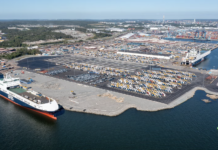
DP World has completed testing of the BOXBAY high bay storage concept at the first full-size facility constructed at Jebel Ali port in Dubai.
More than 63,000 container moves have been completed since the facility, which can hold 792 containers at a time, was commissioned beginning this year.
According to DP World’s statement, the test exceeded expectations with BOXBAY faster and more energy efficient than anticipated.
BOXBAY is a joint venture between DP World and German industrial engineering specialist SMS group.
“The technology we have developed with our joint venture partner SMS group dramatically expands capacity, increases efficiency, and makes the handling of containers more sustainable,” noted Sultan Ahmed bin Sulayem, Group Chairman and CEO of DP World.
The system stores containers in slots in a steel rack up to eleven high, while it delivers three times the capacity of a conventional yard in which containers are stacked directly on top of each other, meaning the footprint of terminals can be reduced by 70%.
In BOXBAY containers are moved in, out and between slots by fully electrified and automated cranes built into the structure.
Additionally, individual containers can be accessed without moving any others, while the whole system is designed to be fully powered by solar panels on the roof.
Modifications made during the trial compared to the original design further improve performance and significantly reduce investment required for future installations, according to DP World.
The UAE-based global operator added that high performance levels of BOXBAY – 19.3 moves per hour at each waterside transfer table to the straddle carrier and 31.8 moves per hour at each landside truck crane – will also reduce the equipment needed in a terminal, while operating costs are also lower than anticipated, with energy costs better by 29%, all at significantly reduced maintenance costs.
Mathias Dobner, Chairman and CEO of BOXBAY, commented, “For ports worldwide, this innovative and disruptive technology will not only increase their over-the-quay-wall handling volumes and container storage capacity, but will also allow them to make a further step towards sustainability, as power regeneration and solar panels on the roof help reduce the CO2 footprint to a minimum.”








